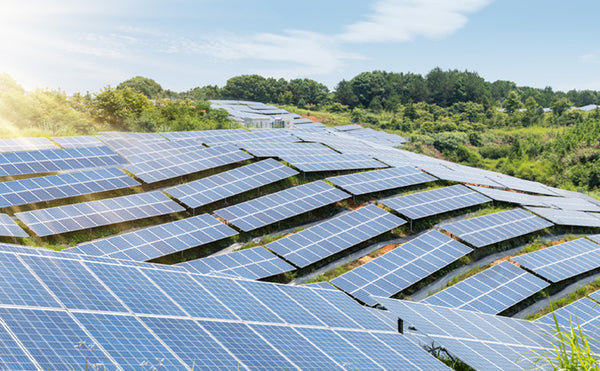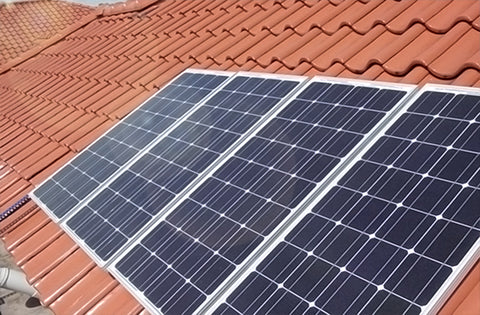As a business owner, one of the highest overhead costs facing you is the cost of electricity. Being reliant on the commercial power grid also means you’re subject to electric rate fluctuations. Sudden price increases add uncertainty to your business, especially to your cash flow management. Maybe it’s time to lessen that load and look at how your business can benefit from solar panel installation.
Solar power panels are rapidly becoming mainstream alternative energy sources in America. You likely heard that Fortune 500 companies such as Walmart and Intel are converting many of their buildings to solar energy. At first glance, you might not think that’s affordable for small or medium-sized business but think again. Solar panels have dropped in price and now offer excellent benefits to organizations like yours.
Now you’re likely thinking, “How can my business benefit from commercial solar panels?” and “Are solar panels worth the investment?” Well, you’re not alone with these questions. The way to answer them is by looking at the benefits for businesses using solar energy.
Why Your Business Should Finally Go Solar
There are several advantages to installing solar panels on a business. Besides using a renewable energy source like the sun, you’re going to get an excellent financial return on your investment over a relatively short time. You can also use solar panels for business tax credits.
Over the last few years, the solar power industry has markedly matured. Solar technology is now an affordable alternate energy option. It’s also a completely dependable and reliable electrical system. That includes being a cost-effective primary electrical source as well as an economical backup power provider.
Solar panels are worth it for businesses for the financial savings alone. EnergySage reports that average commercial business owners’ monthly power bills were $1,950 before converting to solar energy. After solar energy conversion, these business costs dropped to approximately $500. That’s a 75% reduction and a good reason why you should install solar panels at your business.
Using advantages of commercial energy systems like solar panels is keeping up with the times. Many business owners like you realize what excellent pay-offs you get with solar energy, especially with the many state and federal financial incentives available for solar conversions. The solar energy sector is alive with activity. Reports by the Solar Energy Industries Association claim that American businesses installed 14.5 gigawatts in solar infrastructure in 2017. That’s compared to 7.5 gigawatts in 2015, and double the capacity in just one year.
Despite such a leap of faith in solar energy based on clear proof of the benefits of solar power for businesses, the United States solar power industry accounts for 1% of total electrical production. However, the National Renewable Energy Laboratory predicts that eventually, 40% of American electricity will be from solar panels. Clearly, there’s a bright future for installing solar panels in your business.
Solar Power Benefits for Businesses
Deciding to convert your business to solar power isn’t something you should do quickly. You need to thoroughly evaluate your current energy supply situation and assess where you need to be in the future. Like any business investment, you weigh the pros and cons. You know that solar energy is a long-term investment that takes time for a decent return. Ultimately, you’ll make your decision based on the benefits of solar power for your business. Here are some of the main advantages:
- Cuts overhead business costs
- Has future longevity
- Creates energy independence
- Offers excellent tax benefits
- It’s an investment with continuous financial and environmental returns
Those are five excellent benefits from solar power conversion, and five reasons why your business should use solar energy. You’ll be doing the right thing financially and environmentally, as well. Let’s take an in-depth look at how your business can benefit from solar panels.

Cut Overhead Costs With Solar Panels
Like every business owner, you want to cut overhead costs. Business overhead includes many expenses outside of wages and operational materials. In managing a business, you have to pay for supplies, insurance, property maintenance and utilities. One major overhead expense that you can reduce is your electric energy costs.
A consistent energy supply is vital for every business. Depending on your office or facility, you’ll use electric power for more than just lights. You might have electric heating and cooling systems as well as machinery or equipment powered by electricity. Every electrical device demands its share of energy. There’s only so much you can do to make a device electrically-efficient, so the challenge is to reduce your overhead cost of power.
Switching to solar power is a big step. There is no doubt that solar power will reduce your electrical bills by a significant margin. As reported, the average business reduces their electrical overhead by three-quarters. That starts immediately after converting to solar power and continues at that rate for the rest of the system’s life.
When converting to solar power, you should ask yourself if you want to reduce your dependency on the commercial power grid or replace it as much as possible. Unless you go total solar with generator back-up, you’ll still have some tie into the grid for night time and other additional support. No matter how far you take your solar conversion, you’re going to drop your overhead costs and continue benefiting from this substantial saving.
You’ll also get financial reassurance with solar power. When you’re self-sufficient or semi-sufficient on solar power, you’re immune from billing spikes and inflation. Being dependent on the commercial power grid means you’re at their mercy for seasonal or supply shortage cost increases. You’d also be protected from the inevitable inflation as electrical bills keep climbing, year by year.
Having your private power production provided by the sun means you’ll always know what your overhead costs are. You are in control of cutting electrical overheads as you see fit. You’ll always have the same rate unless you choose to add to your electrical load. You’ll also have the peace of mind knowing you’re price protected.
Longevity and Sustainability of Solar Energy
Many people don’t realize it, but commercial electrical power is a commodity. It’s bought and sold based on supply and demand. When you draw from the power grid, you’re subject to current market forces and user rates. You’re not protected from future costs. That’s because futures are unpredictable.
Most futurists predict the world will be less dependent on fossil fuel over the coming decades. Coal and gas-fired electrical generation stations will be more regulated on emissions and their carbon footprint. That means more costs for fossil fuel generation and that has to be passed on to the consumer.
Hydroelectricity is the main power source in areas that have a suitable water supply to turn generators. But the expansion of hydroelectric production means additional flooding. That’s not acceptable in areas where land is a premium. Hydro plants have a limited capacity for output and are already maximized in many stations.
Alternate electrical sources like nuclear plants have dubious futures. Given the volatility of accidents and the nuclear waste problems, the future of nuclear power generation is bleak. That leaves a virtually untapped renewable power source — the sun. Solar power is the future solution to low overhead electrical production.
By converting to solar energy, you’re making an investment in the future of your bottom line. Like the stock market where investors bet on future markets, you can hedge your electrical bet by installing a self-contained solar generation system. With solar power, you benefit from lowering your electrical consumption cost and protecting your company’s future.

Energy Independence
Independence from commercial energy supply sources is another chief benefit you’ll get by converting to solar power. By investing in a self-contained solar system, you can reduce or remove your dependency on your local power company. Besides saving you significant money in overhead costs, you’ll have the assurance of a reliable electric supply regardless of what happens to the commercial grid.
In many areas, commercial power failure is a fact of life. You may be in a power-sensitive industry like cold storage where you can’t tolerate a lapse in your electrical supply. Many areas in America have regular power interruptions from severe storms. When you’re self-reliant on your solar panel system, you’ll have a dependable electrical supply no matter what happens to your commercial power provider.
Properly designed and installed solar panel systems are completely reliable. Unlike machinery or generating equipment, solar panels have no moving parts. You simply have a series of interconnected panels that convert the sun’s rays through a photovoltaic process to produce live alternating current electricity. It’s the same current you get from your commercial power company, but you produce it independently.
With solar energy, you have the option of storing electricity through a battery system. Power is always there when you need a back-up such as night time or fading light.
Solar Tax Benefits
Probably the biggest reward you’ll get by converting to solar electric power is tax benefits. All levels of local, state and federal governments support the move towards renewable, clean and efficient solar power. To show their support, they offer some beneficial tax incentives and financial assistance programs.
Here are the primary tax benefits you’ll receive when you convert your business to solar power:
- 26% Federal Investment Tax Credit (ITC):This United States federal government tax relief allows you a 26% rebate on the overall cost of your solar power system. For instance, if you invested $20,000 in your solar panel installation, you’re entitled to receive a $5,200 tax credit. As well, there is no cap on the program so you can invest as much as you want in solar energy and still receive the 26% rebate. However, the benefit amount decreases after 2022. The ITC decreases to 22% in 2023, and 10% thereafter.
- Accelerated Depreciation: You’re also entitled to accelerated depreciation on your solar energy equipment. This is through another federal government program called the Modified Accelerated Cost-Recovery System (MACRS). While typical equipment depreciation tax deductions normally spread over the entire life of the products, the MARCS initiative allows you to write off your total solar panel system in the first year. This significantly improves your cash flow and the ability to finance your solar power installation.
- Solar Renewable Energy Credits (SRECs): This solar energy option allows you to recover equipment installation costs by using your system’s energy production. Government frameworks calculate one SREC being equal to1,000 kWhs. They make it mandatory for electric companies to participate and honor every SREC you produce from your solar equipment.
These tax advantages aren’t something you have to qualify for by installing a particular type or size of solar panel system in your business. They’re incentives guaranteed by government programs intended to encourage the move towards solar energy no matter what kind of system you install.
Investment With Continuous Financial and Environmental Returns
Although the cost may initially seem high, it’s an investment that will continue to help your bottom line. Depending on the size of your system, it can pay for itself in a couple of years while you benefit from lower or zero electric bills. Businesses of all sizes are finally recognizing that a solar electric energy system is a key strategic decision that guarantees a solid financial return for years to come. It also helps to attract business as many customers are attracted to businesses that are dedicated to sustainability efforts. Just imagine, in three years, the CO2 offset of one 105KW system is equal to 11,004 trees and 49,522 gallons of gas saved.
To learn more about photovoltaic power generation, please follow SOLARPARTS official website:
Homepage: www.isolarparts.com
Email address: Philip@isolarparts.com




